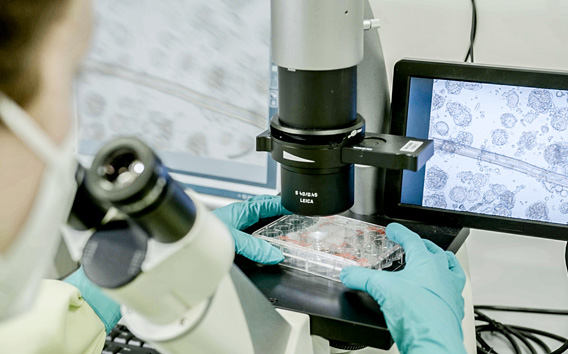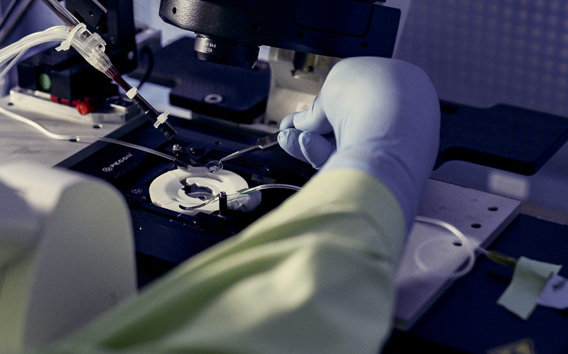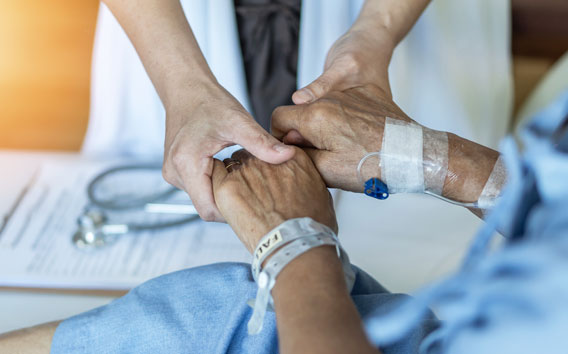

Patient – How we support patients in need
Grünenthal’s focus on patients is at the core of our responsibility approach. We concentrate our efforts on the key areas of patient safety, product quality, improving patients’ quality of life through innovative medicines, access to healthcare and safe pain management through the responsible use of opioids.
Product quality
Rigorous testing, quality control, and regulatory compliance ensure the safety, reliable availability, efficacy and quality of pharmaceutical products. This protects patients, helps improve their health and fosters trust.

Patient safety
While any medicine may cause side effects, Grünenthal’s priority is to ensure that the therapeutic benefits of the medicine outweigh the risks.

Safe healthcare outcomes
Our comprehensive Pharmacovigilance system ensures effective and timely risk identification and mitigation throughout the lifecycle of Grünenthal’s medicinal products. This enables healthcare professionals to be fully informed and prevent or mitigate potential risks. Additionally, it enhances patient awareness of product-associated risks, making it easier for them to relate any adverse events to the product.
Safe pain management through responsible use
Patients should receive appropriate pain management after carefully weighing the benefits and risks of the available options.

Opioid usage
We believe responsibly prescribed opioids should be one of the options available to pain patients. However, these treatments may also carry risks. It is essential that physicians prescribe opioids after careful consideration of the benefits and risks, and that they evaluate all available treatment options.
Pain education
With our CHANGE PAIN initiative, we educate healthcare professionals in pain management – while also educating healthcare professionals and patients on pain conditions. The goal is to build up knowledge on the responsible use of pain medicine to reduce risks related to its misuse.Our Opioid Responsibility Framework
Opioid Statement
Our Opioid Statement is a one-page document that clearly highlights the risks and benefits of this class of medicines. We reference this statement in all materials related to opioids. It clarifies our position for our stakeholders and aims to foster a mindset shift along the entire value chain.
Opioid StatementOpioid Charter
Our Opioid Charter underpins Grünenthal’s position on the responsible medical use of opioid analgesics in pain patients. Our Responsible Opioid Usage Board ensures clear guidance, coherent behaviour, continuous improvement, training and control mechanisms on all matters related to opioids.
Opioid CharterOpioid Communication Guidance
The Opioid Communication Guidance defines principles that apply to all promotional content for these pain treatments. It places a strong focus on ethical responsibilities related to opioid usage.
Research and Development
Our research and development aims to create innovative medicines to improve the quality of life for patients experiencing chronic or acute pain.

R&D for unmet pain needs
There is a substantial unmet need in chronic pain management, as current treatments do not fully address patient needs. Grünenthal seeks to develop innovative pain management medicines that offer improved efficacy with fewer tolerability and safety risks.
This is why a large part of our revenue is reinvested into R&D each year. Our portfolio encompasses more than 1,000 granted patents.
We leverage modern technologies to improve outcomes for patients. For example, we are using Machine Learning based on anonymized human data to increase understanding of disease and improve the design of clinical trials.
The use of digital biomarkers, such as smart watches and telemetry devices to monitor patients’ mobility, heart rates and sleep patterns, may provide deeper insights into potential new therapies.

Promoting pain research
We are committed to building a better future for patients. Participating in various initiatives that advance this goal is essential.
Through the EFIC-Grünenthal-Grant (E-G-G), Grünenthal supports young scientists early in their career in carrying out innovative clinical pain research with up to € 110,000 provided every two years.
Grünenthal is also one of the main sponsors of the Societal Impact of Pain (SIP) platform, a multi-stakeholder partnership aiming to raise awareness of pain and encourage changes to pain policies.
Our Change Pain initiative offers access to medical educational materials on the responsible use of pain medication via various well-established websites such as Dimensione Sollievo in Italy.
Access to healthcare
Manufacturing essential pharmaceuticals is critical to global healthcare.
Grünenthal is committed to balancing profitability with social responsibility, ensuring the availability and affordability of essential medicines for patients in underserved regions. Given the widespread unmet need for acute, chronic, and palliative pain management, Grünenthal prioritises these regions and therefore contributes to improved public health.
Grünenthal has a track record of providing drug donations to patients in need. In 2024, for example, we successfully completed our drug donation programme in Venezuela, providing medications to medical centres supporting pain treatments for palliative care and cancer patients.
Expanding access to palliative care

Palliative care support in Europe
We have a longstanding commitment to preserving dignity and quality of life at the end stage of people’s lives.
The Grünenthal Foundation for Palliative Care was set up in 1998 to promote science and research in this field and to support the care of people with severe or terminal diseases.
The Foundation facilitated the creation of the Department of Palliative Medicine at the Aachen University Hospital in 2003 - the first of its kind in Germany.
M-N/A-DE-08-23-0003

